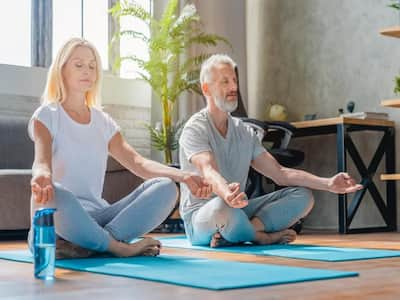
This Yoga Day, make sure to start combining physical exercise with mental well-being, to provide a holistic approach to recovery after a heart procedure.
“Yoga doesn’t just change the way we see things; it transforms the person who sees,” said BKS Iyengar famously.
Yoga alters our approach to life and therefore has a reconstructional impact on our health. This is a vital ingredient to recovery; because following a heart procedure, such as angioplasty, bypass surgery, or even a heart transplant, the road to healing can often be challenging and overwhelming. Physical discomfort, anxiety, and emotional stress are common challenges faced by patients during the recovery process.
Dr. Santosh Kumar Dora, Senior Cardiologist at Asian Heart Institute, Mumbai, says, “In the last decade or so, Yoga has gained recognition as an effective aid to getting back to normalcy. It provides a low-impact exercise option, making it ideal for individuals who have undergone heart procedures and also helps to develop or regain flexibility, strength, balance and coordination. Its controlled movements, coupled with mindful breathing techniques, can help improve blood circulation, flexibility, and strength.”
The Cardiologist also points out a few key benefits of yoga after a heart procedure:
Improves mind-body connection
Yoga offers a unique avenue for patients to reconnect with their bodies after a heart procedure. Yoga helps patients regain confidence in their physical abilities and strengthens their overall sense of self.
Promotes relaxation
Yoga’s focus on deep breathing exercises and meditation cultivates a state of calmness, helping to lower blood pressure, heart rate, and cortisol levels- all of which aid recovery.
READ RELATED: Costco Customers Are Outraged Over the Chain's Harsh Membership Policy
Enhances self-awareness and mindfulness
Yoga allows individuals to listen to their bodies and adjust their practice. This self-awareness extends beyond the yoga mat, empowering individuals to make healthier lifestyle choices, such as adopting heart-healthy diets, managing stress, and engaging in regular physical activity.
Helps deal with emotional challenges
A sustained practice of yoga changes the mental state from ‘reactionary’ to ‘responsive’. This helps individuals to navigate the emotional and psychological challenges that often accompany a heart procedure.
Helps in cardiovascular conditioning
People usually envision some form of aerobic exercise such as walking or bicycling, when the word ‘cardio’ is mentioned. However, various yogic practices like Vinyasa flow style yoga, surya namaskar, are viable and effective alternatives for improving heart strength.
The integration of yoga into the recovery process offers numerous benefits beyond physical healing. However, it is important to consult your doctor or specialists before embarking on a yoga regimen to ensure a safe and effective practice that meets the unique needs of each individual, ensuring a cumulative, progressive approach to recovery, notes Dr. Dora.

Total Wellness is now just a click away.
Follow us on
window.addEventListener(‘load’, (event) => {
// $(document).ready(function(){
$(‘#commentbtn’).on(“click”,function(){
(function(d, s, id) { var js, fjs = d.getElementsByTagName(s)[0]; if (d.getElementById(id)) return; js = d.createElement(s); js.id = id; js.src = “//connect.facebook.net/en_US/sdk.js#xfbml=1&version=v2.3”; fjs.parentNode.insertBefore(js, fjs);}(document, ‘script’, ‘facebook-jssdk’));
$(“.cmntbox”).toggle();
});
// });
});







